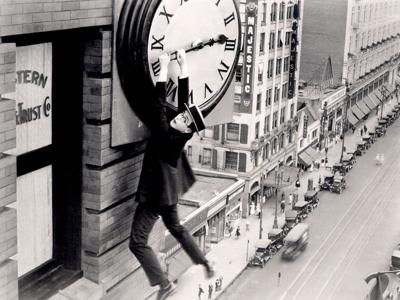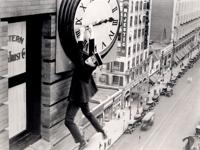No new works of old art have been freed to the public domain in 20 years. But a decades-long copyright moratorium just expired on Jan. 1, and the films, songs, writings, and artwork released in 1923 became fair use to enjoy or adapt under a looser set of intellectual property laws.
This might not sound like a big deal, since it only covers works published in 1923, plus some exceptions can extend the copyright until 70 years after the author’s death. What’s significant is that a 20-year public domain drought is over; on the first day of every year going forward, works copyrighted 95 years prior become fair game for DJs, remixers, and culture jammers because those works have entered the public domain.
“The public domain is an anti-oligarchic force in authorship,” says novelist and special consultant to the Electronic Frontier Foundation Cory Doctorow. “The existence of a robust public domain is one of the ways we can still escape the grip of these oligarchic firms that command a larger and larger percentage of the money that our works generate.”
DJ Adrian A, co-founder of the mashup dance party Bootie Mashup and longtime remixer of other people’s music, tells SF Weekly that some DJs will benefit tremendously from the expiration of 1920s copyrights.
“Electro-swing artists should see a boon in the coming years,” Adrian A notes.
This year’s “graduating class” of famous works entering the public domain include the ragtime songs “Yes, We Have No Bananas” and “Charleston” (which inspired the dance move), short films from Our Gang (who would become The Little Rascals), and Robert Frost’s poem “Stopping by Woods on a Snowy Evening.” Among the famous films freed up are Buster Keaton’s Our Hospitality, Cecil B. DeMille’s original silent version of The Ten Commandments, and Harold Lloyd’s slapstick masterpiece Safety Last!, famed for its climactic dangling-from-a-clock-tower stunt.
Not one published American work has been afforded public domain status since 1998, a time when Google did not yet even exist, let alone YouTube, smartphones, or the web-based concept of “digital media.”
This 20-year freeze on public domain rights was a Mickey Mouse law — literally.
Mickey Mouse’s 1928 debut Steamboat Willie was about to go into the public domain when Congress passed the 1998 Sonny Bono Copyright Term Extension Act — named for the singer and husband of Cher who was eventually elected to the U.S. House of Representatives as a Republican representing Palm Springs. Bono’s law extended copyright protections for an additional 20 years, after extensive lobbying from the Walt Disney Company to prolong its grip on Mickey’s exclusive rights.
That’s ironic, considering how many major Disney cartoons are borrowed works. Classics like Sleeping Beauty, Alice in Wonderland, and Bambi were all reinterpretations of other writers’ stories, as are modern-day notables like Frozen and Tangled.
“People say, ‘How can you be such a giant fan of Disney and its products when they’re so instrumental in extending copyright?’ ” Doctorow tells SF Weekly. “One of the things I love about Disney is how they breathe fresh life into these older stories.
“That connects us with the past,” he adds. “These stories staying alive is how we know who we are as a people.”
You might think copyright laws protect artists’ work from being ripped off. But as a tiny number of powerful corporations control more and more of the media landscape, creators find these so-called protections primarily benefit big studios and tech companies.
“Artists will tell you that they don’t get any money from streaming services. They have these songs that rack up millions of plays, and generate very little cash,” Doctorow points out. “The labels cream off the vast majority of these funds.”
And the labels are fiercely protective of these copyrights, chasing down independent artists and hobbyists who are not even using the work commercially. In one notoriously picky case, Universal Music Group issued a legal notice to a woman whose YouTube video of her toddler dancing to Prince’s “Let’s Go Crazy” went viral in 2007.
“Bootie Mashup has gotten hit with a lot of cease-and-desist letters,” Adrian A tells us. “Right after [Swedish DJ] Avicii died [in April], it seemed we got a cease-and-desist for every single Avicii mashup we had posted on our website.”
File-sharing and streaming services did provide us with an embarrassment of riches of illegal free copyrighted music and movies in recent years. But the biggest services now employ bots to hunt down even the tiniest copyright infractions.
“We just tried to upload our recently-released ‘Best of Bootie 2018’ mixtape,” DJ Adrian A says. “It ended up getting clocked by YouTube’s copyright bots — getting flagged for copyright infringement, and it was blocked.
“We tried a few tips and tricks from our mashup community, like time-stretching and pitch-shifting the music mix, in order to try to fool the copyright bots,” he continues. “It worked for some of the tracks, but not all of them. We kept trying different techniques, but to no avail.” [NOTE: They have since found a workaround, and Best of Bootie 2018 is now available on YouTube.]
Doctorow adds that the bots are programmed to overkill, and generate many false-flag alerts. “The filters are not very good at spotting public domain works,” he says. “They just block things presumptively. You have things that are public domain becoming reprivatized through the back door by these filters.
“The amount of dolphin they catch in their tuna net is just going to get larger and larger,” Doctorow adds. “More and more of us will see our legitimate creations lost.”
It’s a lovely but long-overdue benefit that art from the early 20th century is finally coming into the public domain again. But as still-lucrative creations like Superman, Batman, and Captain America see their public domain release dates looming, you can be sure the Disney-Industrial Complex will fight like hell to retain their exclusive rights.
“I really don’t have issues with artists’ copyrights being protected,” Adrian A says. “I do have an issue when work that is mashed-up and remixed into a derivative work is seen as illegal. I wish the same fair-use rules that apply to parody in the U.S. would be extended to works like mashups and remixes.”
But the law does not see a difference between derivative works and straight-up theft. A treasury of really old creations will finally be released for fair use, but the laws governing remixes, homages, and mashups are still kind of a mish-mash.
A Grand Re-Opening of the Public Domain with Cory Doctorow, Creative Commons founder Lawrence Lessig, and others, Friday, Jan. 25, 1 p.m., at the Internet Archive Headquarters, 300 Funston Avenue, $10; 415-561-6767 or archive.org









